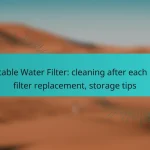A portable water filter is an essential travel companion, designed to provide safe drinking water wherever you go. Lightweight and versatile, these filters effectively remove contaminants from various water sources, ensuring hydration during outdoor adventures or international trips. With their ease of use and efficiency, they make accessing clean water simple and reliable.
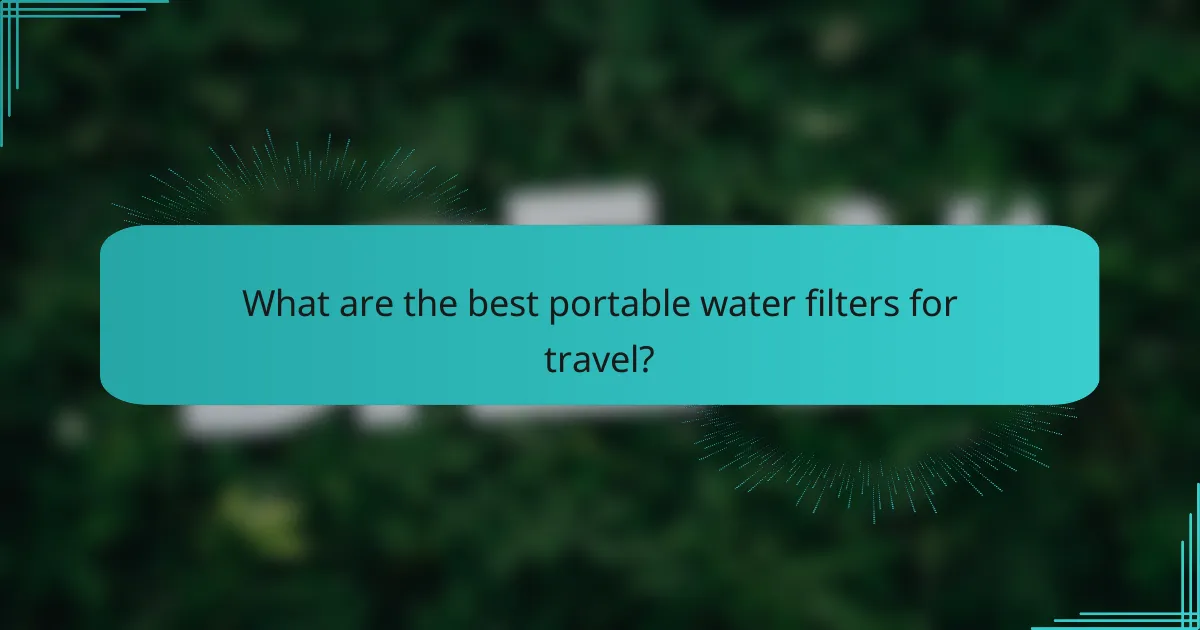
What are the best portable water filters for travel?
The best portable water filters for travel are lightweight, easy to use, and versatile enough to handle various water sources. These filters ensure safe drinking water while on the go, making them essential for outdoor adventures or international trips.
LifeStraw Personal Water Filter
The LifeStraw Personal Water Filter is a popular choice among travelers due to its compact size and effectiveness. It can filter up to 1,000 liters of water, removing bacteria and parasites without the need for chemicals or batteries.
This filter is ideal for hiking and camping, as it allows you to drink directly from streams or lakes. However, it does not remove viruses, so it’s best used in areas where waterborne viruses are not a concern.
Katadyn BeFree Water Filter
The Katadyn BeFree Water Filter offers a flexible and lightweight solution for purifying water. It features a collapsible design that makes it easy to pack, and it can filter up to 1,000 liters while removing bacteria and protozoa.
This filter is particularly user-friendly, allowing you to fill the bag, shake it, and drink directly from the spout. Its fast flow rate makes it suitable for quick hydration during outdoor activities.
Sawyer Mini Water Filtration System
The Sawyer Mini Water Filtration System is another excellent option for travelers, known for its versatility and lightweight design. It can filter up to 100,000 gallons, making it a long-lasting investment.
This system can be used with a variety of containers, including water bottles and hydration packs. It effectively removes bacteria, protozoa, and microplastics, but like the LifeStraw, it does not filter viruses.
Grayl Geopress Water Purifier
The Grayl Geopress Water Purifier is designed for those who need a reliable solution for purifying water from questionable sources. It can filter out viruses, bacteria, and protozoa, making it suitable for international travel.
This purifier works by pressing down on the filter, which takes about 8 seconds to produce clean water. Its compact design and ease of use make it a favorite among travelers who prioritize safety.
MSR Guardian Purifier
The MSR Guardian Purifier is a robust option for serious adventurers, capable of filtering out viruses, bacteria, and protozoa. It features a self-cleaning mechanism that ensures consistent performance, even in challenging conditions.
This purifier can produce up to 2,000 liters of clean water and is built to withstand rugged environments. While it is heavier than other options, its reliability makes it worth considering for extended trips in remote areas.
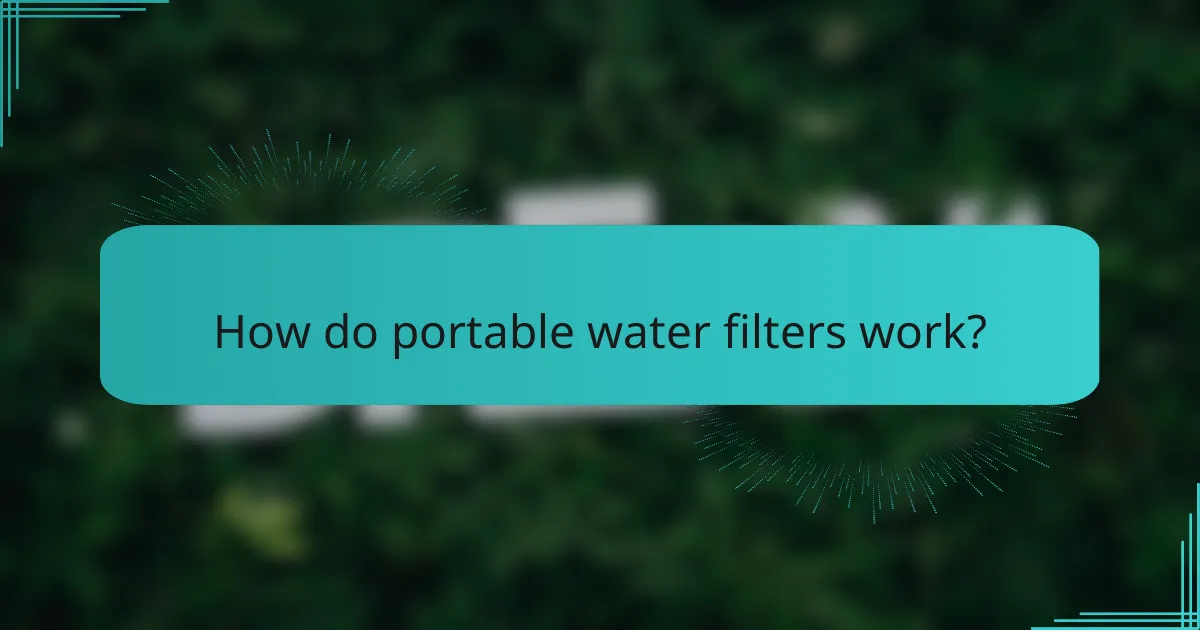
How do portable water filters work?
Portable water filters work by removing contaminants from water, making it safe for drinking. They typically use various filtration methods to eliminate bacteria, protozoa, and other impurities, ensuring clean water during travel or outdoor activities.
Filtration methods
Portable water filters utilize several filtration methods, including activated carbon, ceramic, and membrane filters. Activated carbon filters absorb chemicals and improve taste, while ceramic filters physically block pathogens. Membrane filters, often used in ultrafiltration, can remove particles as small as 0.1 microns.
When selecting a filtration method, consider the types of contaminants in your water source. For instance, if you’re in an area with chemical pollution, activated carbon may be more effective. Always check the filter’s specifications for its contaminant removal capabilities.
Gravity vs. pump systems
Gravity systems rely on the natural force of gravity to filter water, making them easy to use and ideal for groups. You simply fill a reservoir, and the water flows through the filter into a clean container. These systems are generally lighter and require no physical effort.
Pump systems, on the other hand, require manual effort to push water through the filter. They are often faster for individual use and can be more effective in filtering larger volumes of water quickly. However, they can be heavier and require maintenance. Choose based on your travel needs and the volume of water you’ll require.
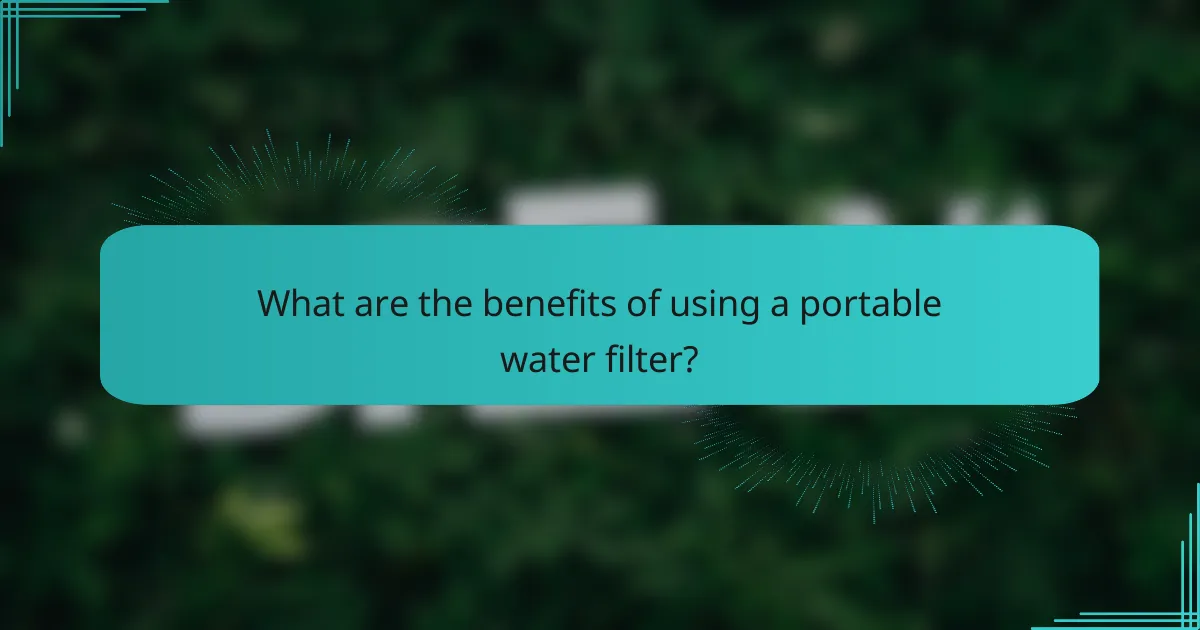
What are the benefits of using a portable water filter?
Portable water filters provide convenient access to clean drinking water while traveling, ensuring safety and hydration. They are essential for outdoor activities and emergencies, allowing users to filter water from various sources quickly and efficiently.
Lightweight and compact design
Most portable water filters are designed to be lightweight and compact, making them easy to carry in a backpack or travel bag. Weighing typically between 200 to 500 grams, these filters can fit into small spaces without adding significant bulk.
This design is particularly beneficial for hikers, campers, and travelers who need to minimize their load. Many models come with collapsible or foldable features, enhancing their portability even further.
Versatile applications
Portable water filters can be used in a variety of situations, from outdoor adventures to emergency preparedness. They are effective for filtering water from rivers, lakes, and even tap water, making them suitable for both recreational and survival scenarios.
Some filters are designed for specific uses, such as gravity-fed systems for group camping or personal straw filters for individual use. When selecting a filter, consider the intended application and the type of contaminants you may encounter in different water sources.
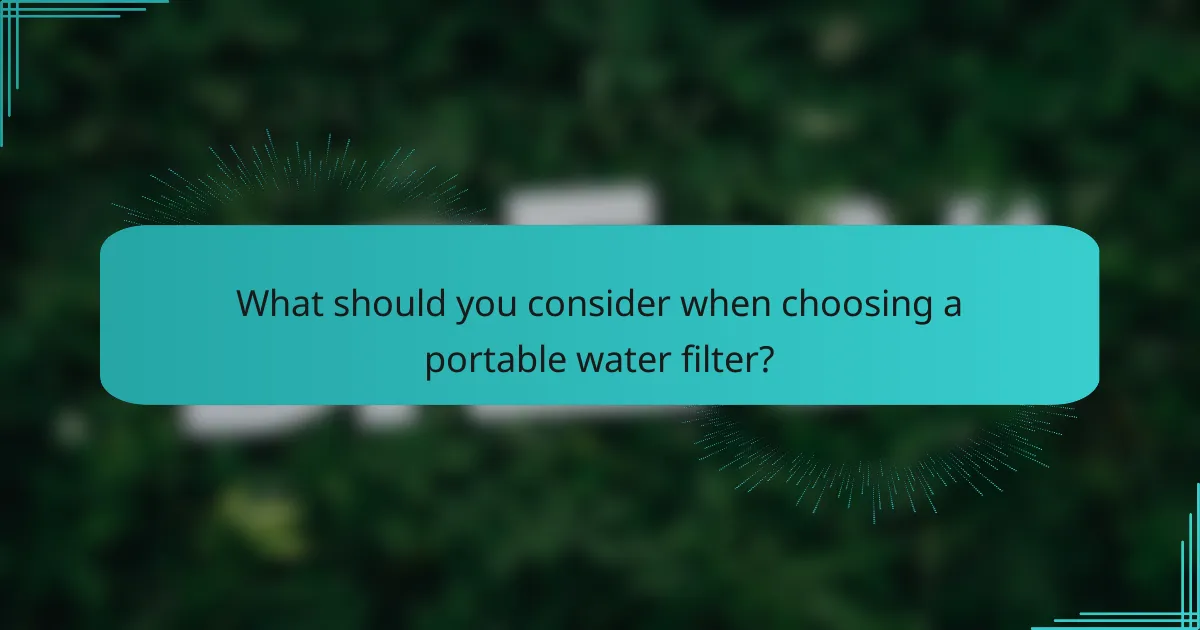
What should you consider when choosing a portable water filter?
When selecting a portable water filter, consider factors such as filtration capacity, weight and size, and ease of use. These elements will significantly impact your travel experience and ensure you have access to safe drinking water.
Filtration capacity
Filtration capacity refers to the amount of water a filter can purify before needing replacement or maintenance. Look for filters that can handle at least several hundred liters, as this will provide ample supply for multiple trips or extended use.
Additionally, check the filter’s ability to remove contaminants. Many portable filters can eliminate bacteria and protozoa, while some advanced models also address viruses and chemicals. Always verify that the filter meets relevant safety standards, such as NSF or EPA certifications.
Weight and size
Weight and size are crucial for portability, especially for travelers and hikers. Aim for filters that weigh less than a kilogram and are compact enough to fit in a backpack or carry-on luggage.
Consider the design as well; some filters come as straws, while others are pump-based or gravity-fed systems. Choose a style that suits your travel needs and space constraints.
Ease of use
Ease of use can greatly affect your experience with a portable water filter. Look for models that require minimal setup and can be operated quickly, especially in outdoor settings where time may be limited.
Read user reviews to gauge how intuitive a filter is in practice. Filters with straightforward instructions and quick-clean features can save you time and frustration during your travels.

Where can you buy portable water filters in the UK?
Portable water filters can be purchased at various locations across the UK, including specialized outdoor retailers and online marketplaces. These options provide a range of products suitable for different travel needs and budgets.
Outdoor retailers
Outdoor retailers such as Go Outdoors, Cotswold Outdoor, and Millets offer a selection of portable water filters tailored for hiking, camping, and other outdoor activities. These stores often provide expert advice and allow you to see the products in person, which can be beneficial for understanding their features and usability.
When shopping at outdoor retailers, consider checking for seasonal sales or promotions, as discounts can significantly reduce costs. Additionally, some stores may have loyalty programs that offer further savings on future purchases.
Online marketplaces
Online marketplaces like Amazon, eBay, and Wiggle provide a vast array of portable water filters, often with user reviews to help guide your decision. Shopping online allows for easy price comparisons and access to a wider selection than most physical stores.
When purchasing from online marketplaces, pay attention to shipping costs and delivery times, as these can vary significantly. It’s also wise to check for warranty information and return policies to ensure you can exchange or return the product if it doesn’t meet your needs.
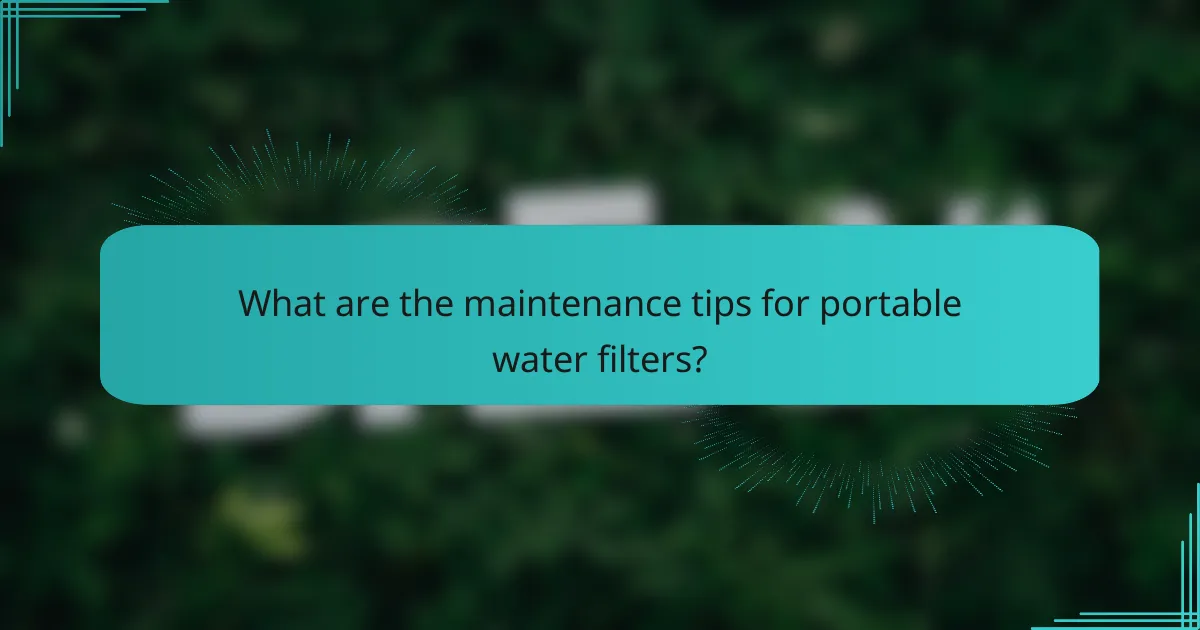
What are the maintenance tips for portable water filters?
To ensure optimal performance and longevity of portable water filters, regular maintenance is essential. This includes cleaning, proper storage, and timely replacement of filter elements.
Cleaning the filter
Cleaning your portable water filter is crucial to prevent clogging and ensure effective filtration. Rinse the filter with clean water after each use to remove sediment and debris. For deeper cleaning, follow the manufacturer’s instructions, which may involve using a mild soap solution or a specialized cleaning kit.
Storage recommendations
Proper storage of your portable water filter can significantly extend its lifespan. Always store the filter in a cool, dry place, away from direct sunlight. If the filter is wet, allow it to dry completely before storing to prevent mold and bacteria growth.
Replacing filter elements
Regularly replacing filter elements is vital for maintaining water quality. Check the manufacturer’s guidelines for replacement intervals, which can vary based on usage and water quality. As a general rule, replace the filter after processing a certain number of liters, typically ranging from hundreds to thousands, depending on the model.

